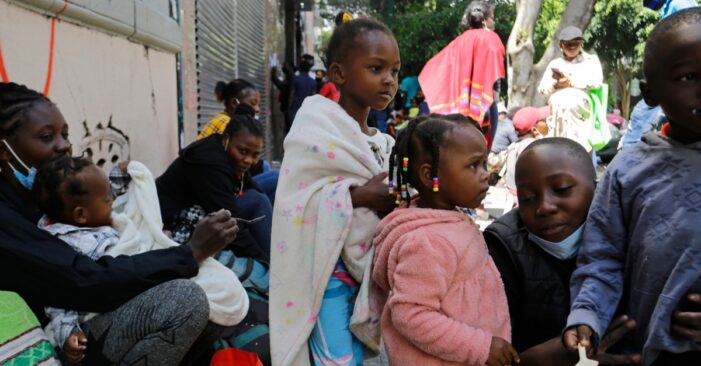Douglas Rivlin: “Our current broken system empowers reckless human smugglers and traffickers and incentivizes dangerous treks to our southern border and on makeshift ocean vessels.”
Washington D.C. – A boat enroute to Miami from Haiti capsized off the Bahamas on Sunday and 17 people died, including 15 women and a little girl. An additional 8-15 could be missing, according to news reports. This is the latest – but by no means the only – tragedy facing migrants seeking safety in the United States. Whether it is at sea or on the arduous journey across land to the U.S. border from South or Central America and beyond, migrants continue to come and die in the attempt. Last month, 53 migrants, mostly from Central America, were found dead in an unventilated truck in San Antonio. These tragedies are emblematic of the larger reality of forced migration in the western hemisphere and the United States’ unwillingness to create accessible, orderly, and safe legal pathways for migration and asylum seekers.
Reuters reports that, according to the U.N., “Last year was the deadliest for migrants crossing the border, with 728 fatalities recorded by the United Nations, which started counting in 2014. The U.N. has counted 340 more this year, apace with 2021’s grim record.”
As Eleanor Acer, Senior Director, Refugee Protection at Human Rights First, noted on Twitter about the 17 Haitian migrants who died off the Bahamas:
“People at risk of persecution & violence need fast, safe routes to seek refuge. Policies that deny visas or prevent people from crossing borders to seek asylum are the opposite of orderly & safe. They spur dangerous journeys & endanger lives.”
The United States has relied over multiple decades on deterrence as its main hemispheric immigration policy. Also over decades, Congress, led by Republicans, has failed to open legal channels for migration or legalize those already living here who could then utilize the legal immigration system to reunite their families. This feeds migrants into ever more dangerous attempts to enter or seek asylum, while also creating a lucrative market for human smugglers. As New York Times reporter Miriam Jordan points out in her article, “Smuggling Migrants at the Border Now a Billion-Dollar Business,” this has been made worse by recent changes to border policies.
“Title 42, the public health order introduced by the Trump administration at the beginning of the coronavirus pandemic, has authorized the immediate expulsion of those caught crossing the border illegally, allowing migrants to cross repeatedly in the hope of eventually succeeding. This has led to a substantial escalation in the number of migrant encounters on the border — 1.7 million in fiscal 2021 — and brisk business for smugglers.”
In an article today in the Texas Observer, ‘Migrant Deaths are a Feature – Not a Bug – Of U.S. Immigration Policy’, reporter Jason Buch explores how Texas Governor Greg Abbott’s policies have added to the deadliness. He also identifies the deterrence-only approach as one of the culprits driving smuggling and deaths.
“Researchers say the cumulative impact of deterrence policies is that they push people into more dangerous routes to the U.S. This country’s immigration laws became more restrictive throughout the 20th century, and the resources devoted to border security have increased into the 2000s. In his 2015 “ethnography of death” in Arizona, the anthropologist Jason De León described “a security apparatus that transparently seeks to deter them through pain, suffering, and death.”
“Those policies are trying to deter people fleeing pain, suffering, and death in their home countries”, said Guerline Jozef, the director of Haitian Bridge Alliance, a nonprofit that provides support to Haitian immigrants in the U.S. Jozef had recently returned to her home in California from the funerals of 11 Haitians in Puerto Rico who drowned trying to reach the U.S. when she learned about the San Antonio tragedy. In a phone interview, Jozef borrowed from the British-Somali poet Warsan Shire, who once wrote, “no one leaves home unless home is the mouth of a shark.”
“When home is the mouth of the shark, you have to leave, you have to flee, to the unknown, because you have no other choice,” Jozef said. “So there is no deterrent practice you will find to stop people from searching for safety. And for the U.S. to create those policies is inhumane and unacceptable.”
According to Douglas Rivlin, Director of Communication for America’s Voice:
“These human tragedies are avoidable; a fact that indicts our array of cruel and failed deterrence-only policies – from the border wall to Title 42 to ‘Remain in Mexico’ – and others based on the wrongheaded notion that if we are cruel enough, we can keep people from migrating in the first place. Instead, our current broken system empowers reckless human smugglers and traffickers and incentivizes dangerous treks to our southern border and on makeshift ocean vessels.
We have long needed a new approach: to put smugglers and traffickers out of business, to expand legal channels for safe and orderly migration, to address and alleviate the root causes of forced migration, and to approach this through cooperation on a hemispheric basis rather than pretending these issues are mostly about our southern border. Where Trump cut investments in Latin America and the Caribbean, we need to increase investments that give people a reasonable chance of surviving in their home countries
Unfortunately, Republicans’ politicization, obstruction, and legal challenges combine to block needed legislative solutions and undermine efforts to get Democrats and the Biden administration to stand strong and forge progress. The American economy and American families demand a level of migration that Congress has been unwilling to sanction, so a great deal of immigration is controlled by smugglers and remains in the black market. It’s migrants like those fleeing Haiti, like those killed in San Antonio, like those languishing in squalid Mexican camps, and those dying in the desert or killed en route who suffer from this fundamental mismatch between the demand for legal immigration and the supply.”

